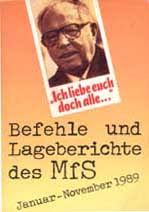 Today (18 march) marks the 20th anniversary of the first free elections in East Germany, less than six months after the mass demonstrations that undermined the communist state, and less than five months after the opening of the Berlin Wall. It was a curious mixture of old and new (the picture shows one of the ballot papers used in the election). The alliance of newly-founded citizens' movements and parties that had originally pledged to fight free elections on a common platform has fractured under the pressure of events: the Social Democratic Party of the GDR (founded by opposition activists) has joined forces with its opposite number in the Federal Republic. Helmut Kohl's (West German) Christian Democratic Union, looking for a partner of its own, has signed up with the East German CDU, for four decades a satellite of the communist SED. with revolutionary legitimacy provided through an "Alliance for Germany" with the Demokratischer Aufbruch, and the small German Social Union. Neues Forum, once the rallying cry of the peaceful revolution has become part of the Bundnis 90 grouping, along with Demokratie jetzt, and the Initiative for Peace and Human Rights. The election has become a battle between the proponents of a rapid and a less-rapid union with the Federal Republic.
Today (18 march) marks the 20th anniversary of the first free elections in East Germany, less than six months after the mass demonstrations that undermined the communist state, and less than five months after the opening of the Berlin Wall. It was a curious mixture of old and new (the picture shows one of the ballot papers used in the election). The alliance of newly-founded citizens' movements and parties that had originally pledged to fight free elections on a common platform has fractured under the pressure of events: the Social Democratic Party of the GDR (founded by opposition activists) has joined forces with its opposite number in the Federal Republic. Helmut Kohl's (West German) Christian Democratic Union, looking for a partner of its own, has signed up with the East German CDU, for four decades a satellite of the communist SED. with revolutionary legitimacy provided through an "Alliance for Germany" with the Demokratischer Aufbruch, and the small German Social Union. Neues Forum, once the rallying cry of the peaceful revolution has become part of the Bundnis 90 grouping, along with Demokratie jetzt, and the Initiative for Peace and Human Rights. The election has become a battle between the proponents of a rapid and a less-rapid union with the Federal Republic. It is election day, and Jane is preaching in Greppin, the small parish hall is packed on this Sunday:
Dear Sisters and Brothers in GreppinAfter the service, Stephen and I go for a walk in the nearby countryside, the Dübner Heide. The GDR seems to have got used to this election, everywhere there are posters put up, torn down, posted over other posters. Then we drive to Leipzig to watch the election results with friends. the results come in. General astonishment when the results are declared: the CDU (which a year earlier had been part of the so-called "Democratic Bloc" with the SED) gets more than 40 percent, the SPD just over half that. 16 per cent for the Party of Democratic Socialism, which used to be the SED. Just 2.9 percent for the civic rights activists in Bündnis 90. Before the election, many commentators had treated an SPD victory as a foregone conclusion. I'm disappointed too, but I hadn't expected it to be different.
As I prepared for my year in the GDR I never thought that I would experience free and open elections here. Maybe I should say that I grew up with politics, my father has been for many years either the mayor or the opposition leader in our town. When the elections took place, the children of course wanted to help, it was just something we took for granted. I can still remember that last year I thought that this at least was something I would not be doing in the GDR. But now there are free elections, a wonderful thing to be happening. Yet in many of the discussions I have had, I have noticed that the closer that election day comes, the greater the uncertainty about "what comes after". It's difficult to live with uncertainty, but it was also much more difficult when we knew exactly what would happen next. Our text today (Hebrews 11:8-10) is about Abraham and how he was ready to live with uncertainty:
8 By faith Abraham, when called to go to a place he would later receive as his inheritance, obeyed and went, even though he did not know where he was going. 9 By faith he made his home in the promised land like a stranger in a foreign country; he lived in tents, as did Isaac and Jacob, who were heirs with him of the same promise. 10 For he was looking forward to the city with foundations, whose architect and builder is God.
... I don't know about you, but I would not like to spend my life in a tent. Living in tents is a dangerous business. But how can we learn to live in tents in this time of anxiety before the election. How do we learn to live with uncertainty. There's no easy answer, no promise that things will get better. But one thing is sure, God does not want us to build walls to cut ourselves off. A tent is sensitive to wind and to rain. We must be sensitive, sensitive to other people, talk about our fears.






